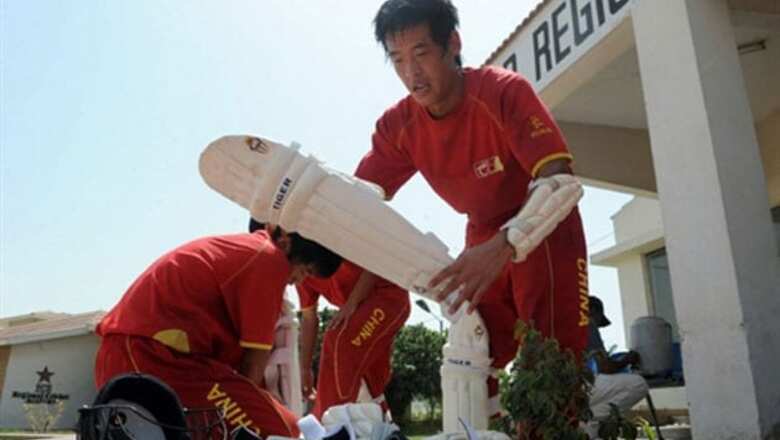
views
Guangzhou: Rashid Khan's uphill battle to help China win a medal in cricket in the sport's Asian Games debut got considerably more achievable when India decided not to send teams to Guangzhou.
Still, the ex-Pakistan Test cricketer told the Associated Press he wants to keep his ambitions in check for the Chinese men's and women's teams he is coaching.
All tickets for Saturday's opening day at the 6,500-seat Guanggong Cricket Stadium have been sold. Not surprisingly, a Chinese team will be involved in the first match — the women taking on Malaysia.
Khan says the Asian Games will be an ideal opening for China to move ahead in cricket and he is targeting a semifinal spot for the women's team which is in a group containing Malaysia, Thailand and Pakistan.
The format of the men's competition — even without India — might be too tough for China as they would have to face one of the favorites if they advance to the quarterfinals. Pakistan and Bangladesh were seeded directly into the quarterfinals.
"It will be a huge task," Khan said of beating either of those potential opponents. "One should be realistic but I just want my boys to do well and be competitive."
He's predicting more for the women, though, expecting wins over Thailand and Malaysia in Group A.
"We have beaten Malaysia recently and have a good idea about them. We were beaten by Thailand two years ago but have improved a lot since then."
All-rounder Mei Hua was also confident of putting on a good show.
"The Games are in our country and it will be ideal if we win a medal," she told AP. "We have done so much hard work that I am confident of beating Malaysia and Thailand from our group and make it to the semifinals."
In recent months, Khan has taken the Chinese women's team twice on tours to India and once to Bangladesh to prepare for the Twenty20 format at the Asian Games.
China expects to meet the winner of Group B — comprising Bangladesh, Hong Kong, Nepal and Japan — in the semifinal.
Cricket is among the sports making its Asian Games debut at Guangzhou. Dance, dragon boat racing and roller sports are others.
Asian Olympic Council secretary-general Randhir Singh was upset that his country hadn't sent teams to the games.
"We're extremely disappointed that India is not here. We were looking forward to India coming in and their being here would have made a lot of difference to the event," Singh, who is an International Olympic Committee member, said in an interview on Wednesday.
"When India lobbied and the Asian Cricket Council lobbied very strong for it, they promised that they would be here and that they'd send their best teams — and then they dropped out."
Singh said cricket was booming in the region since the advent of the Twenty20 format and didn't expect India's absence from the Asian Games would jeopardise its position in the sports program for the 2014 Asiad in South Korea.
The absence of regional powerhouse India did open up the competition for some otherwise unlikely contenders, he said.
"Anybody can win in this new format."
Khan — who played four Test matches for Pakistan and took eight wickets as a right-arm medium fast bowler — moved to nearby Shenzen in October 2006 with a challenge to teach Chinese men and women how to play cricket.
"The best thing about these Chinese is that they are very quick learners," Khan said of his squad. "I didn't have much problem in teaching them how to bowl and field but batting is one area which you could only develop by putting more and more practice into it."
Instead of scouting mature athletes from other sports, Khan targeted school and university students who could be groomed into good cricketers.
"Chinese students have germs of sports in them and even in a few colleges and schools they were playing cricket with tennis ball when I came here four years ago," he said.
Khan began his coaching at Tong Le school in Shenzen, shortlisting 24 under-15 players, mostly from baseball.
"I showed them lots of videos and the task got easier for me," he said.
Within a few months, Chinese boys went on to beat Myanmar in an Asian Cricket Council Under-15 tournament and that gave Khan more confidence.
Gradually Khan widened his search to scout students from Beijing and Shanghai. And in 2007, he started working with the Chinese women's team.
It took him only a year before China qualified for the semifinals of Asian Women's Cup.
Khan says Chinese athletes are "most hardworking, dedicated and physically fit" sports people in the world.
"That's why you see China doing so well at all the major international events like Olympics and Asian Games," he said. "They are not like other Asian countries, for example India and Pakistan, where people only want to excel in just cricket and nothing else."
Last week, Khan took a young Chinese men's team to Hong Kong for Super Sixes tournament and was surprised by how they performed in a one-wicket loss to the hosts.
"I was simply shocked because I was not expecting them to do so well," he said. "They were hitting sixes and fours like any other international cricketer in the competition, which was pleasing to watch."















Comments
0 comment